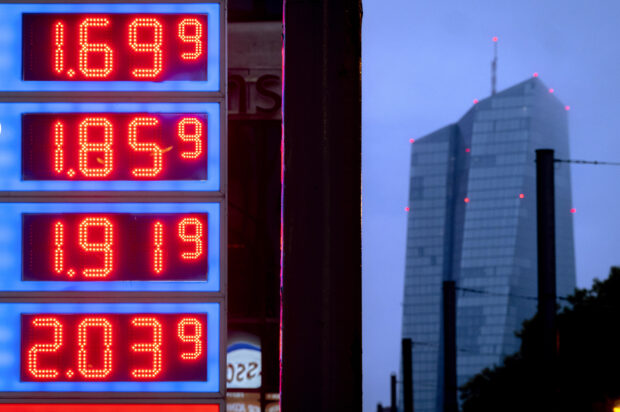IMF warns Europe against prematurely declaring victory over inflation

Gas prices are displayed at a gas station next to the headquarters of the European Central Bank, rear, in Frankfurt, Germany, on July 28, 2023. The inflation that has been wearing on European consumers fell sharply to 2.9% in October, its lowest in more than two years as fuel prices fell and rapid interest rate hikes from the European Central Bank took hold. (AP Photo/Michael Probst, File)
FRANKFURT, Germany — The European Central Bank and other policymakers across Europe need to keep interest rates at current elevated levels until they’re sure inflation is under control despite sluggish growth, the International Monetary Fund said Wednesday, warning against “premature celebration” as inflation declines from its peak.
The Washington-based IMF said the cost of underestimating inflation’s persistence could be painfully high and result in another round of rate hikes that could rob the economy of a large chunk of growth.
The European Central Bank, the Bank of England and the other central banks that aren’t part of the 20-country eurozone “are reaching the peak of their interest rate cycles, while some have started to reduce policy rates,” the IMF said in its twice-yearly regional economic outlook for Europe. “Nonetheless, a prolonged restrictive stance is still necessary to ensure that inflation moves back to target.”
Historically, it takes an average of three years to return inflation to lower levels, while some anti-inflation campaigns have taken even longer, the IMF said. While central banks appear to have ended their series of hikes, a failure to finish the job and the resulting return to rate hikes could cost as much as a full percentage point of annual economic output.
Alfred Kammer, director of the IMF’s Europe department, warned against “premature celebration” as he spoke to journalists in connection with the outlook. “It is less costly to be too tight than too loose” with interest-rate policy, Kammer said. The ECB, which halted its rate increases at its Oct. 26 for the first time in over a year, “is in a good spot,” he said.
Inflation in the eurozone peaked at 10.6 percent in October 2022, and has steadily fallen to 2.9 percent in October.
READ: At halfway point, next challenges loom for ECB’s Lagarde
The European Central Bank has raised its benchmark deposit rate by fully 4.5 percentage points between July 2022 and September 2023, from minus 0.5 percent to 4 percent.
Higher rates are the typical tool central banks use to control inflation, since higher rates mean higher borrowing costs for consumer purchases and financing new officials and factory equipment. That reduces demand for goods and eases pressure on prices, but can also hurt growth – a difficult tightrope act for the ECB.
READ: ECB can aim for soft landing for economy – Villeroy
The Bank of England left its benchmark rate unchanged at 5.25 percent at a policy meeting last week.
The IMF said Europe was headed for a “soft landing” after the impact of the rate hikes and did not foresee a recession, while growth forecasts remained uncertain and could turn out better or worse than expected.
It forecast growth for the region – including the UK and Switzerland as well as the 27-country European Union – of 1.3 percent this year and 1.5 percent next year. For the eurozone, the outlook is for 0.7 percent growth for this year and 1.2 percent next year.
If inflation falls faster than expected, it will boost consumer real income and spending and growth might improve. But an escalation of Russia’s war against Ukraine and accompanying increased sanctions and disruptions to trade could mean weaker growth.
For now, the monthlong war between Israel and Hamas in Gaza has led to a temporary rise in oil prices but has not disrupted the European economy, Kammer said.